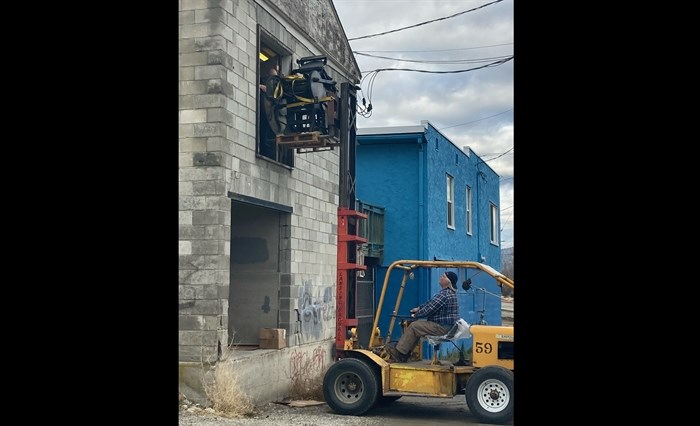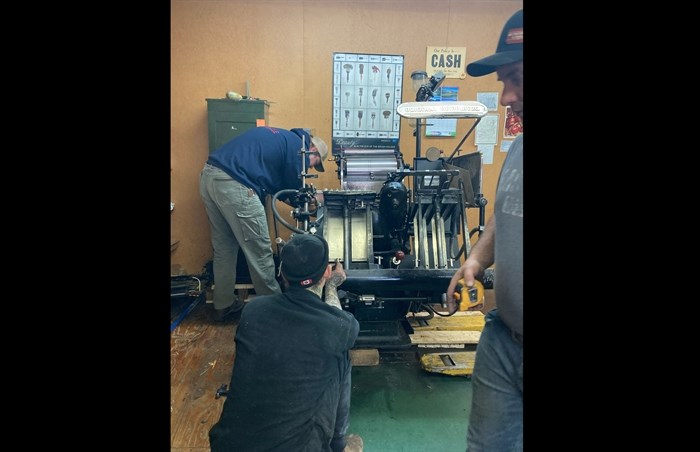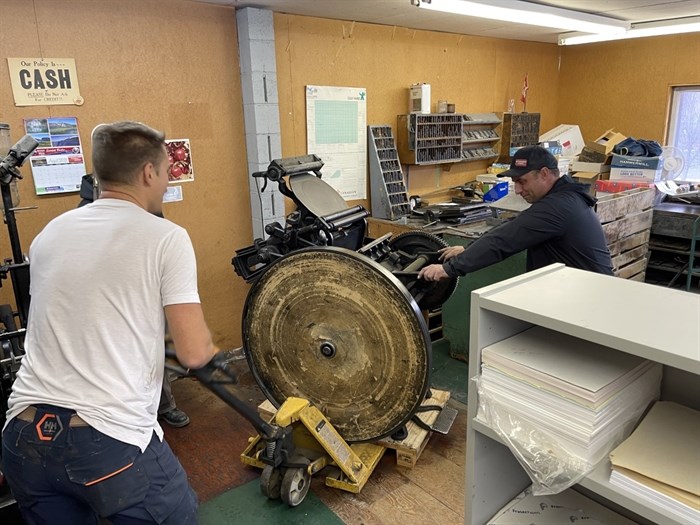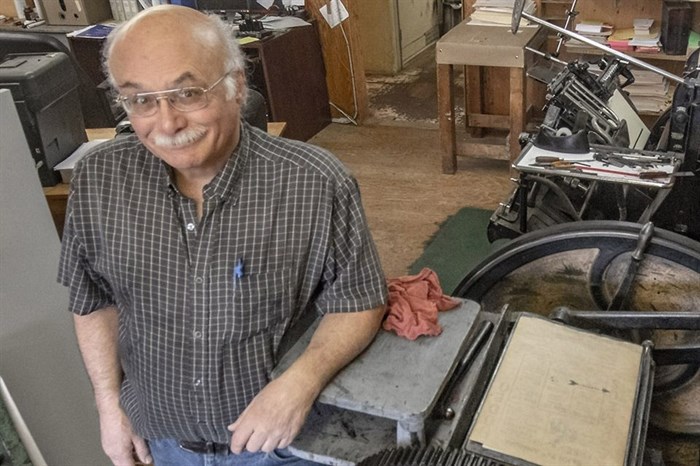
A forklift was needed to help transport old printing presses from Oliver to Barkerville.
Image Credit: SUBMITTED/Teresa Somerville
January 29, 2022 - 3:36 PM
A new home has been found for a pair of industrial-era printing presses that helped run Oliver Printing for decades until the owner’s death in 2021.
There were worries about the future of Rob Somerville’s old-school printers after he passed away unexpectedly last October. His shop was like a museum. Although he was still able to turn a profit with the historical machines, not many other people are capable of running a printing company with such old equipment.
But fortunately the presses have been donated to a community where pioneer technologies are celebrated – the Barkerville Historic Town and Park.
"Oh my gosh I was ecstatic when I got ahold of them," said Teresa Somerville, the widow of Rob, who donated the presses.
Before getting in touch with the historical community, Teresa said the only other interest came from people collecting scrap metal who offered her around $500 for everything.
"I just couldn’t see those pieces of history getting bought for scrap metal," she said. "I am just so happy. I am sure everybody in the family is feeling like we are blessed that this happened."
And just like at Oliver Printing, Rob's retro presses won't be sitting idle in Barkerville.
“They’ll be getting used for sure,” said James Douglas, Barkerville Historic Town and Park’s director of public programming.
“They won’t just sit in a basement or in a display and rust away. This is a tremendously valuable donation."
READ MORE: There's a new gold rush on the way in the Cariboo
Despite the amount of mileage on the machines since they were manufactured many decades ago, Rob left them behind in great shape because he was running them regularly, Douglas said, adding that metal tends to rust fast when it sits dormant.
“There was not a broken piece on it all, everything intact,” he said.
“Nothing was rusted, even the manual from 1957 was still in the drawer – Rob certainly knew how to handle his initial investment.”
One antique press that used to print the Oliver Chronicle now has a new home at the Cariboo Sentinel Printing Press, where a newspaper was published regularly from June 1865 to October 1875 – the height of the gold-rush era.
Each issue of the Sentinel sold for a hefty $1 and that number is not adjusted for inflation. The Bank of Canada’s inflation calculator only goes back to 1914, but Douglas figures $1 back then would have been equivalent to about $30 in 2022.
READ MORE: Ancient garbage pile provides a window to the past of Barkerville's Chinese residents
Investors from around the world were curious to keep tabs on the gold rush in Barkerville, and even though delivery in the 1800s was slow by modern standards, Douglas said many international readers would wait as long as it took to get their hands on the latest edition of the Cariboo Sentinel.
“Not everything used to just come out of a printer like we have now,” he said. “It was a very complicated process of evolution to get to where we are now in our printing world.”
Back then, printing presses were crucial for attracting miners, prospectors and merchants to help build up a boomtown, according to Stewart Cawood, Barkerville’s production manager. Initially, he said, gold nuggets could easily be found by combing rivers, and rumours of that spread far and fast.
But it wasn’t long before the low-hanging fruit was all gone and mining gold would require hard labour from 50 feet down a shaft. Once all of the worthwhile land was claimed, wishful prospectors would arrive to discover that their only option was to work for others. However news of an oversaturated mining community travelled much slower than the promises of a rewarding gold rush, Cawood said.
"This gives us an opportunity to educate people not only how the press itself works, but how important media was in the gold rush era," he said.

Not many people in 2022 are familiar with disassembling printing presses.
Image Credit: SUBMITTED/Teresa Somerville
The other old-school press donated on behalf of Rob has been transported to the Theatre Royal in Barkerville. It will be used to create programs for the entertainment and has been positioned for the public to see.
Industrial-era printing presses offer a fascinating glimpse into both local and human history. The machines may be large and heavy and obsolete in most ways, but the engineering was meticulous and ultimately they were built to last much longer than the revolutionary technologies that made them irrelevant. And in the era of digital communication, it probably won’t be practical to build new ones anytime soon.
“Yeah it may have taken forever to set all the type – but once that type is set, you could print 1,000 pieces of paper with the exact same message in a day,” Cawood said. “That would have taken years by hand.”
Douglas and Cawood caught wind of the situation when a friend of Rob's from Penticton sent them an email. Accepting the donation would mean transporting thousands of pounds of giant machinery over 700 kilometres, but they were more than happy to go to that effort.

James Douglas and Stewart Cawood from Barkerville Historic Town and Park traveled to Oliver to pick up a couple of printing presses.
Image Credit: SUBMITTED
The two men used a Ford F350 with a 25-foot flat deck trailer behind them to move the machines, which they estimate to weigh around 3,500 pounds combined. Unsurprisingly, they noticed a big difference in fuel consumption loaded up on the way home compared to their empty trip south.
Once the machines were detached from the floor – which had to be reinforced with metal plates to support all that weight on the building's second storey – they could only fit through the back door, which was about 12 feet above the ground, so a forklift operator from a local fruit-packing plant came to help. Also, the Somervilles' two sons as well as around 15 firefighters from Okanagan Falls Fire Department – which Rob was the captain of – were there to assist.
"We’re just a couple artists here in Barkerville, we're not used to moving giant heavy presses," Douglas said.
“This story is so lovely. Somebody like Rob who cared so much about theses presses, the legacy of what they were able to do for him and his family, and now they’re able to live on for another century.”
The two men figure if they put enough love and care into the presses as Rob did, the machines will be able to last for another century.

A photo of Rob Somerville in his element.
Image Credit: Dan Walton/Courtesy of Oliver Chronicle

One of the printing presses that belonged to Rob Somerville.
(DAN WALTON / iNFOnews.ca)
To contact a reporter for this story, email Dan Walton or call 250-488-3065 or email the editor. You can also submit photos, videos or news tips to the newsroom and be entered to win a monthly prize draw.
We welcome your comments and opinions on our stories but play nice. We won't censor or delete comments unless they contain off-topic statements or links, unnecessary vulgarity, false facts, spam or obviously fake profiles. If you have any concerns about what you see in comments, email the editor in the link above.
News from © iNFOnews, 2022